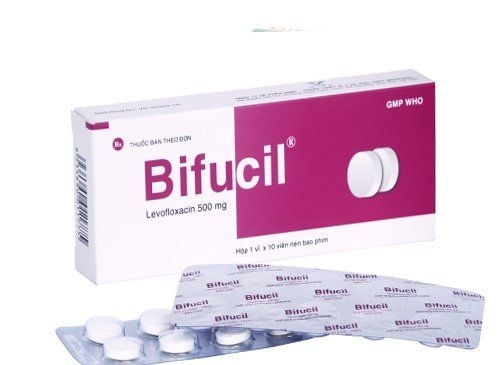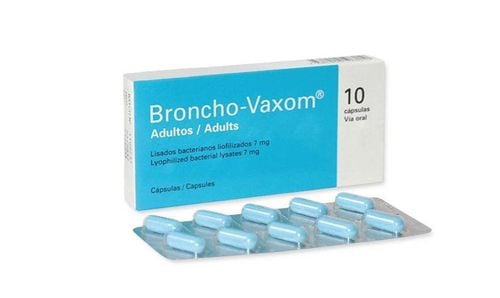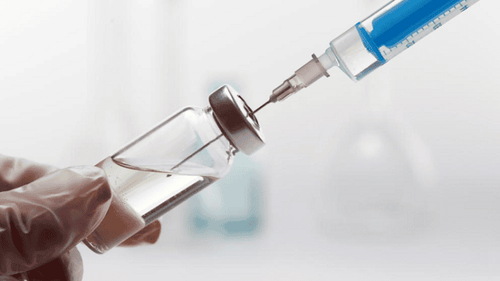This is an automatically translated article.
Goldvoxin is a broad-spectrum antibiotic that is used intravenously to treat bacterial infections. Let's learn about Goldvoxin drug information through the article below.
1. What is Goldvoxin?
The ingredient Levofloxacin in Goldvoxin is a synthetic antibacterial fluoroquinolone. Like other drugs in the same class, levofloxacin inhibits bacterial DNA synthesis by acting on the gyrase complex and topoiso-merase IV DNA. In vitro Levofloxacin is highly bactericidal. The spectrum of activity includes many Gram-positive and Gram-negative bacteria such as staphylococcus, streptococcus, pneumococcus, enteric bacteria, Haemophilus influenzae, non-fermenting Gram-negative bacteria and even non-fermentative bacteria. particular. There is usually no cross-resistance between levofloxacin and other antibacterial drugs because of different mechanisms of action.In the case of nosocomial infections due to Pseudomonas aeruginosa, it is often necessary to add a combination antibiotic therapy or, preferably, to use an antibiogram.
2. Uses of the drug Goldvoxin
Goldvoxin in the form of intravenous solution is effective in some cases such as:
Community-acquired pneumonia. Acute exacerbation of chronic bronchitis. Acute sinusitis. Urinary tract infections with or without complications. Prostatitis . Infections of the skin and subcutaneous tissue with or without complications. Treatment of anthrax. Goldvoxin is contraindicated in the following cases:
Hypersensitivity to the active ingredient Levofloxacin, other quinolones or any of the excipients in the drug. Children under 18 years old. In patients with epilepsy, G6PD deficiency. In patients with a history of tendon disease associated with the use of fluoroquinolones. Women who are pregnant and breastfeeding.
3. Usage and dosage of the drug Goldvoxin
3.1 How to use Goldvoxin is prepared in the form of an intravenous solution that should be administered by intravenous infusion. You will be given an infusion of medicine by a medical staff, the infusion time depending on the dose usually lasts from 60 to 90 minutes. Do not use intramuscular, subcutaneous, or spinal injection.
3.2 Dosage of the drug Goldvoxin Respiratory tract infections:
Exacerbation of chronic bronchitis: Use at a dose of 500mg/day for 7 days. Community-acquired pneumonia: 500mg, 1 to 2 times/day for 7-14 days. Acute maxillary sinusitis: 500mg, once/day for 10-14 days. Skin and subcutaneous tissue infections:
Complicated infections: Use 500mg, 1 time / day for 7-10 days. Uncomplicated: Use at a dose of 250mg, once a day for 3 days. Acute pyelonephritis and pyelonephritis: 250mg once a day for 10 days.
Treatment of anthrax: Use intravenous infusion, then take the drug when the patient's condition allows, at a dose of 500mg, once a day for 8 weeks.
Prostatitis: Use 500mg/24 hours, intravenous infusion. After a few days can switch to oral form.
Complicated urinary tract infections, acute pyelonephritis:
Creatinine clearance > 20ml/min: Initial dose is 250mg, maintenance dose is 250mg/24 hours. Creatinine clearance from 10-19ml/min: Initial dose is 250mg, maintenance dose is 250mg/48 hours. Other indications:
Creatinine clearance from 50-80ml/min: No need to adjust dose Creatinine clearance from 20-49ml/min: Initial dose is 500mg, maintenance dose is 250mg/24 hours. Creatinine clearance 10-19ml/min: Initial dose is 500mg, maintenance dose is 125mg/24 hours. Hemodialysis: Initial dose 500mg, maintenance dose 125mg/24 hours.
Dosage for patients with liver failure, the elderly: No need to adjust the dose.
Children: Do not give Levofloxacin to children under 18 years of age.
3.3 Overdose May cause symptoms such as convulsions, prolongation of QT interval, dizziness, cognitive disturbances. There is no cure for overdose, but symptomatic treatment is required.
4. Side effects when taking Goldvoxin
Some undesirable effects are thought to occur when using Goldvoxin, including:
Common side effects: Nausea, diarrhea; Increase liver enzymes; Insomnia, headache; Irritation at the injection site. Uncommon side effects: Dizziness, nervousness, agitation, anxiety; Abdominal pain, flatulence, indigestion, vomiting, constipation; Hyperbilirubinemia; Itching, rash. Rare side effects: Increase or decrease in blood pressure, arrhythmia; Pseudomembranous colitis, dry mouth, gastritis, tongue edema; Arthralgia, muscle weakness, myalgia, osteomyelitis, Achilles tendonitis; Convulsions, unusual dreams, depression, psychosis; Quincke's edema, anaphylaxis, Stevens-Johnson and Lyelle syndrome. Some other side effects may not be listed here. When taking this medicine, if you experience any side effects, tell your doctor.
5. Notes and cautions when using Goldvoxin thuốc
During use of the drug, your skin will be more sensitive to the sun and may burn, burn or blister, so you need to avoid sun exposure, if you need to go out, you should use sunscreen with High SPF, always wear a hat and long-sleeved shirt, long pants to avoid sun exposure. Sun exposure should be avoided during and for 48 hours after the end of the last dose. Serious and potentially disabling adverse reactions, including tendinitis, tendon rupture, arthralgia, myalgia, peripheral neuropathy, and adverse effects on the nervous system such as hallucinations, anxiety, depression, insomnia, headache, and confusion. Discontinue use at the first suspected sign or symptom of any serious adverse reaction. Tendonitis that can rupture is more common in people over 65 years of age and taking corticosteroids. Especially in the first 48 hours of taking the drug. Care should be taken when using these two objects. Pseudomembranous colitis due to non-susceptible bacteria may also occur. It is necessary to monitor for signs of continuous bowel movements while taking the drug. Because this condition can be life-threatening, it should be detected early and treated promptly.
6. Goldvoxin drug interactions
Drugs that may increase the chance of side effects when taken with Levofloxacin include:
Corticosteroids: When taking this anti-inflammatory drug can cause inflammation and/or rupture of tendons. Warfarin: used to prevent blood clotting may increase the risk of bleeding. Theophyllin: A drug used in respiratory diseases that can cause fainting spells or shocks if taken with Levofloxacin. Non-steroidal anti-inflammatory drugs (NSAIDS): such as Aspirin, Ibuprofen, Fenbufen, Ketoprofen and Indomethacin can cause patients to experience side effects such as fainting or dizziness if taken with Levofloxacin. Co-administration of Levofloxacin with Cyclosporin, Digoxin may enhance the side effects of Ciclosporin or Digoxin Drugs that affect heart rhythm: This group includes medicines for irregular heart rhythms (antiarrhythmics such as Quinidine and Amiodarone). ), medications for depression (tricyclic antidepressants such as amitriptyline and imipramine), some antipsychotics, and medicines for infections (macrolide antibiotics such as erythromycin, azithromycin, and clarithromycin). Levofloxacin should not be used concurrently with hypoglycemic agents, as the risk of hypoglycaemia may be increased. Levofloxacin must not be taken at the same time of day with the following medicines, as they may affect the mechanism of action of Levofloxacin: Iron supplements (for iron deficiency anemia), antacids containing magnesium or aluminum or Sucralfate (treatment of stomach ulcers), zinc supplements. If you are taking iron tablets, antacids or Sulcralfate, zinc supplements, you should take them at least 2 hours before or after taking Levofloxacin. Hopefully, with the above information, you know what Goldvoxin is and what it does. This is a medicine prescribed by a doctor, you should follow the doctor's instructions when taking it.
Please dial HOTLINE for more information or register for an appointment HERE. Download MyVinmec app to make appointments faster and to manage your bookings easily.













